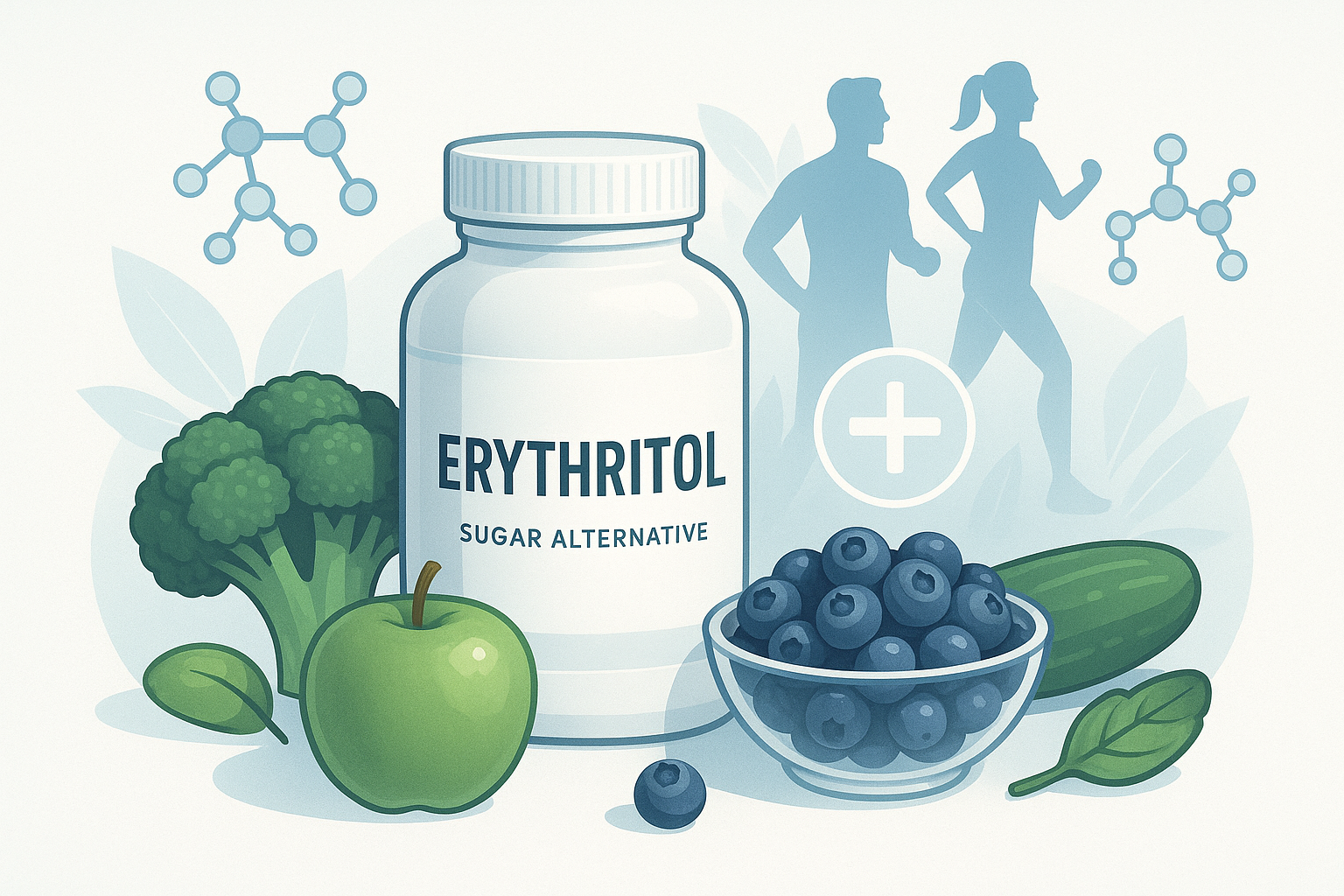What is Erythritol? Definition, Benefits, Risks & Supplement Insights
Table of Contents

Definition: What Is Erythritol?
Erythritol is a sugar alcohol (polyol) widely used as a low-calorie sweetener in foods and nutritional supplements. Naturally occurring in some fruits and fermented foods, it’s primarily produced industrially by fermenting glucose with yeast or other fungi. According to the Mayo Clinic, erythritol offers almost zero calories and a negligible effect on blood sugar, making it a popular choice among health-conscious consumers.
How Erythritol Works in the Body
What sets erythritol apart from regular sugar and many other sweeteners is its unique metabolic pathway. After ingestion, about 90% of erythritol is quickly absorbed in the small intestine, enters the bloodstream, and is then excreted unchanged in urine. This means:
- Virtually zero calories: Unlike sugar, erythritol provides almost no energy (PubChem).
- Little to no blood sugar/insulin spike: This makes it a fit for diabetes-friendly and keto diets.
- Minimal digestive upset: Compared with other sugar alcohols (like xylitol or sorbitol), erythritol is less likely to cause bloating or gas because it isn’t fermented much by gut bacteria.
Health Benefits and Applications
Erythritol’s sweetening profile (about 60-80% as sweet as table sugar) and clean taste allow it to replace sugar in a range of products, such as:
- Sugar-free or low-calorie chewable supplements, gummies, and effervescent tablets
- Functional foods for blood sugar management, weight control, and dental health
Key Benefits
- Blood sugar management: Erythritol does not cause spikes in blood glucose or insulin levels, as confirmed by clinical research and trusted health authorities like the FDA.
- Dental safety: It does not promote tooth decay, unlike table sugar.
- Weight & metabolism: Provides sweetness with almost no calories, supporting weight control regimens.
Potential Risks & Controversies
Though erythritol is Generally Recognized As Safe (GRAS) by the FDA, a few considerations are important:
- Digestive tolerance: Consuming large amounts may lead to mild digestive issues (nausea, bloating), though this is less common than with other sugar alcohols.
- Emerging cardiovascular concerns: Newer studies, referenced by sources like Mayo Clinic and Cleveland Clinic, have suggested a potential association between high erythritol blood levels and increased cardiovascular risk. However, these findings remain under scientific debate, and most health authorities consider erythritol safe when used in moderation. If you have specific cardiovascular concerns, consult your healthcare provider before making dietary changes.
Erythritol vs. Other Sweeteners — At a Glance
| Sweetener | Calories (per g) | Sweetness (vs. sugar) | Glycemic Index | Digestive Tolerance | Typical Use Cases |
|---|---|---|---|---|---|
| Erythritol | 0.2 | 60-80% | ~0 | High (best) | Supplements, keto, diabetes |
| Xylitol | 2.4 | 100% | 13 | Moderate | Dental health, gums, candy |
| Stevia | 0 | 200-300% | 0 | High | Drinks, supplements, baking |
| Sucralose | 0 | 600% | 0 | High | Diet soda, processed foods |
| Allulose | 0.4 | 70% | 0-1 | High | Keto foods, bars, syrups |
Related Concepts
- Sugar Alcohol (polyol): The broader class including erythritol, xylitol, and sorbitol.
- Stevia: A plant-derived, non-caloric sweetener often paired with erythritol.
- Diabetes-friendly Supplements: Products formulated with little or no impact on blood sugar.
- Low Glycemic Index Foods: Foods that have a minimal effect on blood glucose levels.
Erythritol and Naxttii Health: A Science-First, Consumer-Driven Approach
While erythritol is not currently featured in Naxttii Health’s supplement lineup, our brand invests deeply in ingredient safety and scientific rigor. Whether formulating with innovative compounds like Tongkat Ali, Maca, or plant-based alternatives, every Naxttii Health product is chosen to meet the needs of health-conscious, sugar-aware individuals.
We prioritize:
- Evidence-based, science-backed ingredient selection.
- Transparency around sweetener choices and potential health impacts.
- Offering diverse, effective options for blood sugar, metabolic, and general wellness support.
Looking for safe, effective nutritional solutions? Explore Naxttii Health’s full range of supplements and access our science-backed guides to daily wellness.
References:
- Mayo Clinic Q&A: Is erythritol a safe and healthy sugar substitute?
- Cleveland Clinic: The Truth About Erythritol (https://health.clevelandclinic.org/erythritol)
- PubChem: Erythritol
This article is for informational purposes only and does not substitute for medical advice. Always consult a healthcare provider for personalized recommendations.

Poseidon
Master of Nutritional Epidemiology, University of Copenhagen, Herbal Functional Nutrition Researcher
Focus: The scientific application of natural active ingredients such as Tongo Ali, Horny Goat Weed, and Maca to sexual health and metabolic regulation.
Core Focus:
Men: Use a combination of Tongo Ali (an energizing factor) + Maca (an energy reserve) to improve low energy and fluctuating libido.
Women: Use a combination of Horny Goat Weed (a gentle regulator) + Maca (a nutritional synergist) to alleviate low libido and hormonal imbalances.
Stressed/Middle-Aged Adults: This triple-ingredient synergy supports metabolism, physical strength, and intimacy.
Product Concept:
Based on traditional applications and modern research (e.g., Tongo Ali promotes testosterone-enhancing enzyme activity, and icariin provides gentle regulation), we preserve core active ingredients and eschew conceptual packaging—using natural ingredients to address specific needs.
Simply put: I'm a nutritionist who understands "herbal actives." I use scientifically proven ingredients like Tongo Ali, Epimedium, and Maca to help you make "sexual health" and "nutritional support" a daily routine.
